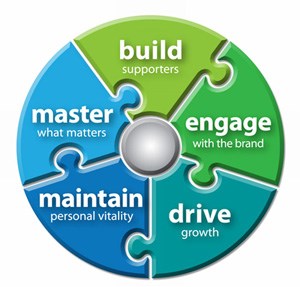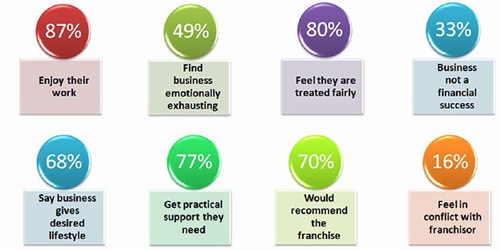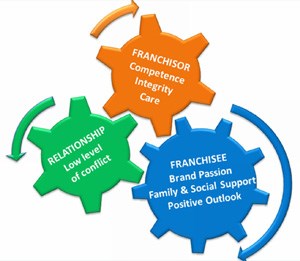
Top stories


ESG & Sustainability#BudgetSpeech2026: SRD grant unchanged, other Sassa social grants see hike
14 hours



More news












ESG & Sustainability
South Africa’s carbon tax should stay: climate scientists explain why









Begin with Wheel of excellence
The franchisor and franchisee 'wheel of excellence' needs to work in congruence to keep the cogs of the franchise systems well oiled.
The franchisee wheel includes the franchisee's primary responsibilities of building supporters, engaging with the brand, driving growth and mastering what matters.

The franchisor wheel comprises the ability to recruit quality franchisees successfully, mentoring franchisees for performance, listening to franchisee feedback, engaging franchisees with the brand and leading with credibility.

In measuring and correlating certain franchisee attributes with levels of franchise success; three primary criteria: financial performance, customer experience and constructive participation were used. Of the 2401 franchisees surveyed, mostly in Australia with a number of contributions from franchisees in South Africa and New Zealand, the data collected was based on various franchisee aptitudes. This included personal attributes, backgrounds and involvement in the business, and in turn, the impact these factors have on franchisee performance and satisfaction.
In addition, 2083 franchisors' performance ratings were unpacked, encompassing 74 franchise systems and serving as a cross reference for the franchisee's submissions. The franchisor ratings were based on financial achievement (sales and profitability), customer experience (customer service, local area marketing) and constructive participation (compliance, trustworthiness, interaction and prospective reselection of the franchisee).
| Participating franchise systems | 74 |
| Average # franchisees per system | 99 |
| Average response rate | 33% |
| Average age | 46.2 yrs |
| Average tenure | 6.7 yrs |
| Males | 61% |
| Females | 39% |
| Multi-unit franchise owners | 22% |
| Average # franchises for multi-units | 3.5 |
| Average # employees for franchisees | 11.9 |
It is interesting to note that the average age of a franchisee in the sample was 47 years old. There are considerably more males than females operating franchises and 22% of the sample was multi-unit operators. Most multi-unit operations comprised of 3-4 franchise businesses.
A snapshot of key satisfaction areas showed that:
These statistics certainly auger well for franchising and clearly show that the franchise industry is alive and kicking. The majority of franchisees (62%) work 40 hours or more in their businesses per week, with only 9% working less than 20 hours a week, thus illustrating the shift in franchisees becoming more hands on in their approach.
As expected, there was a direct correlation between the 'hard work' statistics and the performance of the franchise. Interestingly however, those who worked between 20-30 hours a week in their business gleaned the most satisfaction from their businesses compared to those who worked less or more hours but working 40-50 hours a week was best for overall performance. The research also showed that those franchisees that spend more than 60 hours a week in their businesses were the most dissatisfied.
The issue of franchisee burnout was addressed. Spouse involvement has been shown to have a direct bearing on the financial achievement on the business. However, most burnout happens with a spouse involved on a full time basis, with burnout being markedly less when spouses work on a part time basis. The support of family and friends plays a pivotal role in the success of the business.
The attributes that clearly stood out in making a difference to business performance were family and social support, a positive outlook and brand passion. These were consecutively the biggest contributors to business success or failure, followed by leadership potential, pro-activity, business acumen and finally sales orientation.
The top 20 performers in the sample were very strong in the first four predictors. Comfort with technology, emotional resilience, absence of conflict and reliability were the least necessary attributes of the top performing franchisees in this set of criteria. There was clearly an inverse relationship with these same predictors with the 20 poorest performers.
An interesting revelation what that 28% of franchisors stated that they would not reselect the franchisee if they knew then what they know now. This was predominately due to poor operational commitment, lack of the 'get up and go' factor, poor compliance as well as negative attitudes and behaviours. As one franchisor put it, "They spend time chasing shiny objects...as opposed to following the proven system they purchased."
A most striking finding was that a franchisee's negative outlook on his business had the same dire consequences as poor familial and social support. The passion with which a franchisee engages with the brand drives the success thereof. In fact, figures showed that poor financial performance is mostly affected by a negative attitude and lack of social support. A lack of brand passion had the worst impact on constructive participation in the franchise system.

The key factors in getting others to be strong 'promoters' of the franchise are that the franchisors need to show competence, integrity and care. In addition, franchisees needs to possess the three top attributes previously mentioned and there needs to be a low level of conflict in the relationship between franchisor and franchisee. It was reassuring to see that a significant 66% of franchisees surveyed would recommend the franchise to other parties. Only 6% felt strongly about not recommending the franchise opportunity.
Nathans legendary E-Curve, which depicts franchisee satisfaction by tenure, was re-validated in this research. It seems that franchisees are at their peak of satisfaction at the initial stages of opening the business and become progressively less satisfied over time. In the main, franchises hit the lowest satisfaction point after five years of tenure (probably around the time for renewal of most franchise agreements). Provided the franchisor manages the 'rebellious' franchisee in a mature and careful fashion, the franchisee normally starts reconciling with the franchisor and, by 10 years of tenure, they are generally satisfied with the franchise opportunity (albeit never as satisfied as they were at the outset).
A review area that was quite surprising was the difference in performance between single and multi-unit franchise operators. Overall, multi-unit franchise operators were happier than their single unit franchisee counterparts were in the areas of work satisfaction, intention to stay, advocacy, work life balance and particularly in financial performance, where 56% of franchisees joined in order to firstly, build wealth and secondly have more flexibility.
The franchisees most satisfied were those that were involved in the business on a full time basis but mainly in an overseeing capacity ie working 'on' their businesses and not 'in' their businesses. This resulted in more satisfaction than those franchisees that were operational. Conversely, the least satisfied franchisees were those with very little involvement in the business. It is in every franchisor's best interest to convert franchisees to positive contributors to the brand.
